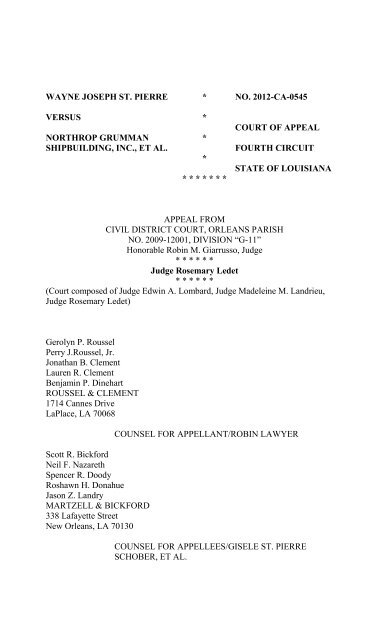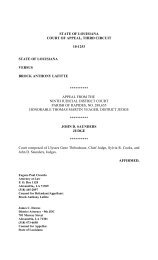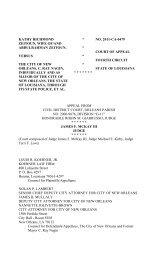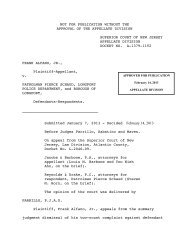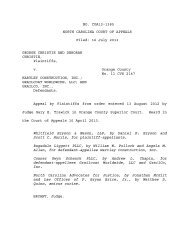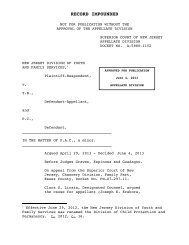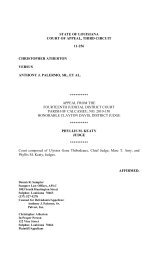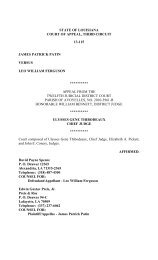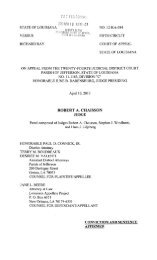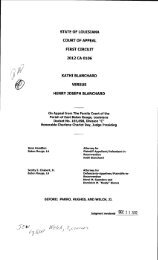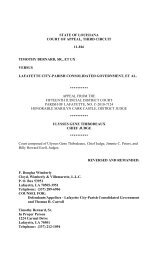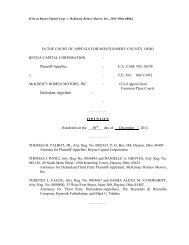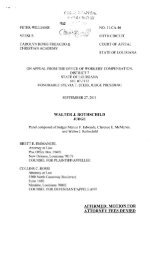Document generated from the Louisiana Court of Appeal, Fourth ...
Document generated from the Louisiana Court of Appeal, Fourth ...
Document generated from the Louisiana Court of Appeal, Fourth ...
You also want an ePaper? Increase the reach of your titles
YUMPU automatically turns print PDFs into web optimized ePapers that Google loves.
WAYNE JOSEPH ST. PIERRE<br />
VERSUS<br />
NORTHROP GRUMMAN<br />
SHIPBUILDING, INC., ET AL.<br />
*<br />
*<br />
*<br />
*<br />
* * * * * * *<br />
NO. 2012-CA-0545<br />
COURT OF APPEAL<br />
FOURTH CIRCUIT<br />
STATE OF LOUISIANA<br />
APPEAL FROM<br />
CIVIL DISTRICT COURT, ORLEANS PARISH<br />
NO. 2009-12001, DIVISION ―G-11‖<br />
Honorable Robin M. Giarrusso, Judge<br />
* * * * * *<br />
Judge Rosemary Ledet<br />
* * * * * *<br />
(<strong>Court</strong> composed <strong>of</strong> Judge Edwin A. Lombard, Judge Madeleine M. Landrieu,<br />
Judge Rosemary Ledet)<br />
Gerolyn P. Roussel<br />
Perry J.Roussel, Jr.<br />
Jonathan B. Clement<br />
Lauren R. Clement<br />
Benjamin P. Dinehart<br />
ROUSSEL & CLEMENT<br />
1714 Cannes Drive<br />
LaPlace, LA 70068<br />
Scott R. Bickford<br />
Neil F. Nazareth<br />
Spencer R. Doody<br />
Roshawn H. Donahue<br />
Jason Z. Landry<br />
MARTZELL & BICKFORD<br />
338 Lafayette Street<br />
New Orleans, LA 70130<br />
COUNSEL FOR APPELLANT/ROBIN LAWYER<br />
COUNSEL FOR APPELLEES/GISELE ST. PIERRE<br />
SCHOBER, ET AL.
Gary A. Lee<br />
David L. Hoskins<br />
Richard M. Perles<br />
A. Ann Cates<br />
David M. Abdullah<br />
LEE FUTRELL & PERLES, L.L.P.<br />
201 St. Charles Avenue, Suite 4120<br />
New Orleans, LA 70170<br />
AND<br />
Samuel M. Rosamond III<br />
Adam D. Demahy<br />
CRAWFORD LEWIS PLLC<br />
400 Poydras Street, Suite 2100<br />
New Orleans, LA 70130<br />
AND<br />
COUNSEL FOR DEFENDANT/ALBERT L. BOSSIER, JR.,<br />
ET AL<br />
COUNSEL FOR DEFENDANTS/ONEBEACON AMERICAN<br />
INSURANCE COMPANY; ET AL<br />
Brian C. Bossier<br />
Christopher T. Grace, III<br />
Edwin A. Ellinghausen, III<br />
BLUE WILLIAMS, L.L.P.<br />
3421 North Causeway Boulevard, Suite 900<br />
Metairie, LA 70002<br />
COUNSEL FOR DEFENDANTS/N.G. SHIPBUILDING,<br />
ET AL.<br />
AFFIRMED<br />
OCTOBER 24, 2012
This appeal arises out <strong>of</strong> a pre-trial dispute regarding attorney‘s fees and<br />
costs. Attempting to preserve <strong>the</strong>ir alleged rights to recover such fees and costs,<br />
<strong>the</strong> plaintiff, Robin Lawyer, and her attorney, <strong>the</strong> law firm <strong>of</strong> Roussel & Clement,<br />
APC (<strong>the</strong> ―Roussel Firm‖) (collectively <strong>the</strong> ―Intervenors‖) filed an intervention in<br />
this asbestos exposure case. In response, <strong>the</strong> three co-plaintiffs and several<br />
defendants filed peremptory exceptions <strong>of</strong> no cause and no right <strong>of</strong> action. From<br />
<strong>the</strong> trial court‘s judgment sustaining <strong>the</strong> exceptions and dismissing <strong>the</strong><br />
intervention, <strong>the</strong> Intervenors appeal. For <strong>the</strong> reasons that follow, we affirm.<br />
FACTUAL AND PROCEDURAL BACKGROUND<br />
On October 12, 2009, Wayne Joseph St. Pierre, Sr., was diagnosed with<br />
meso<strong>the</strong>lioma. On October 30, 2009, Mr. St. Pierre and his third wife, Ms.<br />
Lawyer, entered into a ―Retainer Agreement and Contract <strong>of</strong> Employment‖ with<br />
<strong>the</strong> Roussel Firm, which provided for a 40% contingency fee (<strong>the</strong> ―Contingency<br />
Fee Agreement.‖) The Roussel Firm recorded <strong>the</strong> Contingency Fee Agreement in<br />
<strong>the</strong> public records in <strong>the</strong> Parish <strong>of</strong> Orleans. On November 12, 2009, Mr. St. Pierre<br />
1
commenced this suit against multiple defendants seeking to recover damages<br />
arising out <strong>of</strong> his exposure to asbestos. On December 18, 2009, Mr. St. Pierre died<br />
<strong>from</strong> meso<strong>the</strong>lioma.<br />
Following Mr. St. Pierre‘s death, his surviving spouse, Ms. Lawyer, and his<br />
three surviving children <strong>from</strong> his two prior marriages—Wayne St. Pierre, Jr.;<br />
Gisele St. Pierre Schober; and Cherie St. Pierre (collectively <strong>the</strong> ―St. Pierre<br />
Children‖)—were substituted as plaintiffs. All four plaintiffs asserted claims for<br />
survival and wrongful death damages under La. C.C. arts. 2315.1 and 2315.2.<br />
The instant dispute, which relates only to <strong>the</strong> survival action, arose because<br />
<strong>the</strong> surviving spouse and <strong>the</strong> surviving children retained separate counsel.<br />
Following Mr. St. Pierre‘s death, Ms. Lawyer continued her attorney-client<br />
relationship with <strong>the</strong> Roussel Firm under <strong>the</strong> Contingency Fee Agreement, which<br />
she and Mr. St. Pierre signed. 1 The St. Pierre Children retained <strong>the</strong> firm <strong>of</strong> Martzell<br />
& Bickford, A.P.C. (<strong>the</strong> ―Bickford Firm‖). Citing <strong>the</strong> involvement <strong>of</strong> separate<br />
counsel and <strong>the</strong> necessity to engage in separate settlement negotiations with each<br />
group <strong>of</strong> plaintiffs, Albert L. Bossier, Jr., and Melton Garrett (two <strong>of</strong> <strong>the</strong><br />
―Avondale Interests Defendants‖), 2 filed a Motion for Order Governing Allocation<br />
<strong>of</strong> Damages and Determination <strong>of</strong> Credits for Settlements in Survival Action. Mr.<br />
1 As discussed elsewhere in this opinion, <strong>the</strong> attorney-client relationship between Mr. St. Pierre and <strong>the</strong> Roussel<br />
Firm automatically terminated upon his death.<br />
2 The ―Avondale Interests Defendants‖ are defined as Albert L. Bossier, Jr.; J. Melton Garrett, The Travelers<br />
Indemnity Company; Northrop Grumman Shipbuilding, Inc. (n/k/a) Huntington Ingalls Incorporated, f/k/a Avondale<br />
Industries, Inc., f/k/a Avondale Shipyards, Inc.), and American Motorist Insurance Company. According to <strong>the</strong><br />
Avondale Interests Defendants, <strong>the</strong>y are only parties to <strong>the</strong> survival action; <strong>the</strong>y were dismissed <strong>from</strong> <strong>the</strong> wrongful<br />
death action on summary judgment based on <strong>the</strong> exclusivity provisions <strong>of</strong> <strong>the</strong> <strong>Louisiana</strong> Workers‘ Compensation<br />
Act.<br />
2
Bossier and Mr. Garrett moved for an order that any damages awarded in <strong>the</strong><br />
survival action would be divided equally among <strong>the</strong> four La. C.C. art. 2315.1<br />
beneficiaries, one-fourth share each (25%). Ms. Lawyer opposed that motion and<br />
contended that, as <strong>the</strong> surviving spouse in community, she was entitled to receive a<br />
five-eighths share <strong>of</strong> any such damages (62.5%) and that <strong>the</strong> St. Pierre Children<br />
should only receive one-eighth shares each (12.5%). Ms. Lawyer fur<strong>the</strong>r argued<br />
that <strong>the</strong> proposed order, providing for an equal division <strong>of</strong> one-fourth share to each<br />
plaintiff, would interfere with <strong>the</strong> Contingency Fee Agreement. The interference,<br />
she contended, was that it would reduce <strong>the</strong> amount <strong>of</strong> damages to be awarded to<br />
Ms. Lawyer without taking into account <strong>the</strong> independent interest <strong>of</strong> <strong>the</strong> Roussel<br />
Firm, as <strong>the</strong> attorney for Mr. St. Pierre and Ms. Lawyer, under La. R.S. 37:218.<br />
Disagreeing with Ms. Lawyer, <strong>the</strong> trial court on November 18, 2011, entered<br />
<strong>the</strong> following order:<br />
Any damages awarded by <strong>the</strong> jury in <strong>the</strong> survival action will be<br />
apportioned equally among <strong>the</strong> four plaintiffs. Fur<strong>the</strong>r, any credits for<br />
settlements will be determined and applied with respect to <strong>the</strong> survival<br />
action plaintiffs in <strong>the</strong> following manner:<br />
(1) The jury will be instructed to render a verdict reflecting <strong>the</strong><br />
total amount <strong>of</strong> damages assessed for <strong>the</strong> pre-death injuries <strong>of</strong> Wayne<br />
Joseph St. Pierre, Sr.;<br />
(2) The <strong>Court</strong> will <strong>the</strong>n apportion <strong>the</strong> total survival action damages<br />
awarded among <strong>the</strong> plaintiffs by heads, allocating to each plaintiff a<br />
one-fourth virile share <strong>of</strong> <strong>the</strong> total damages awarded;<br />
(3) The <strong>Court</strong> will <strong>the</strong>n reduce each plaintiff‘s one-fourth virile<br />
share <strong>of</strong> <strong>the</strong> total survival action damages awarded by <strong>the</strong> virile share<br />
attributable to any defendant found liable by <strong>the</strong> trier <strong>of</strong> fact with<br />
whom that plaintiff has settled, and will render judgment accordingly.<br />
3
(4) Nothing in <strong>the</strong> Order shall in any way affect <strong>the</strong> rights <strong>of</strong><br />
counsel for plaintiffs pursuant to LSA R.S. 37:218 or o<strong>the</strong>r applicable<br />
laws.<br />
The last paragraph <strong>of</strong> <strong>the</strong> order, preserving <strong>the</strong> rights <strong>of</strong> plaintiffs‘ counsel<br />
―pursuant to LSA R.S. 37:218 or o<strong>the</strong>r applicable laws,‖ was added to address Ms.<br />
Lawyer‘s objections. The trial court denied ex parte Ms. Lawyer‘s motion for new<br />
trial on its ruling regarding <strong>the</strong> allocation <strong>of</strong> damages. Both this court 3 and <strong>the</strong><br />
<strong>Louisiana</strong> Supreme <strong>Court</strong> 4 denied Ms. Lawyer‘s writ application seeking review <strong>of</strong><br />
<strong>the</strong> trial court‘s ruling regarding <strong>the</strong> allocation <strong>of</strong> damages.<br />
Meanwhile, on November 4, 2011, Ms. Lawyer and <strong>the</strong> Roussel Firm filed a<br />
petition <strong>of</strong> intervention in which <strong>the</strong>y averred:<br />
Pursuant to LSA-R.S. 37:218, <strong>the</strong> law firm <strong>of</strong> Roussel & Clement acquired<br />
an interest in <strong>the</strong> subject matter <strong>of</strong> <strong>the</strong> above captioned lawsuit and a special<br />
privilege to take rank as a first privilege for attorney‘s fees outlined in a<br />
contract signed by Wayne Joseph St. Pierre and Robin Lawyer on<br />
October 30, 2009. (Exhibit No. 1 [Copy <strong>of</strong> Contingency Fee contract]). The<br />
contract has been filed with <strong>the</strong> clerk <strong>of</strong> court in <strong>the</strong> Parish <strong>of</strong> Orleans. In<br />
addition, Robin Lawyer has an interest in recovering <strong>the</strong> costs and expenses<br />
she has incurred and/or paid with regard to <strong>the</strong> prosecution <strong>of</strong> <strong>the</strong> claim as<br />
well as an interest in <strong>the</strong> costs and expenses she will incur and pay.<br />
The law firm <strong>of</strong> Roussel & Clement intervenes into <strong>the</strong>se proceeding [(sic)]<br />
for its attorney‘s fees pursuant to LSA-R.S. 37:218 or o<strong>the</strong>r applicable laws<br />
and Robin Lawyer intervenes for <strong>the</strong> costs and expenses she has incurred<br />
and/or paid with regard to <strong>the</strong> prosecution <strong>of</strong> <strong>the</strong> claim as well as for <strong>the</strong><br />
costs and expenses she will incur and pay.<br />
No settlement, compromise, discontinuance or o<strong>the</strong>r disposition <strong>of</strong> this<br />
matter are valid without <strong>the</strong> attorney fee interest <strong>of</strong> <strong>the</strong> law firm <strong>of</strong> Roussel<br />
& Clement being paid pursuant to LSA-R.S. 37:218 or o<strong>the</strong>r applicable laws<br />
and <strong>the</strong> costs incurred and/or paid satisfied.<br />
In <strong>the</strong> petition, <strong>the</strong> Intervenors prayed for attorney‘s fees, costs, and expenses.<br />
3 St. Pierre v. Northrop Grumman Shipbuilding, Inc., 12-C-0004 (La. App. 4 Cir. 2/12/12) (unpub.).<br />
4 St. Pierre v. Northrop Grumman Shipbuilding, Inc., 12-0614 (La. 4/27/12); 86 So.3d 629.<br />
4
In response, <strong>the</strong> St. Pierre Children filed peremptory exceptions <strong>of</strong> no cause<br />
and no right <strong>of</strong> action. 5 The St. Pierre Children contended that <strong>the</strong> Roussel Firm<br />
lacked standing under La. R.S. 37:218 to assert a claim against <strong>the</strong>m because that<br />
statute applies only to an attorney‘s client and <strong>the</strong> St. Pierre Children were never<br />
<strong>the</strong> Roussel Firm‘s clients (it nei<strong>the</strong>r represented <strong>the</strong>m nor had a written contract<br />
for legal services with <strong>the</strong>m). As to Ms. Lawyer, <strong>the</strong> St. Pierre Children contended<br />
that she lacked standing to intervene under La. R.S. 37:218 and that nothing under<br />
that statute ―provides for recovery <strong>of</strong> costs and expenses.‖<br />
The Avondale Interests Defendants also filed peremptory exceptions <strong>of</strong> no<br />
cause and no right <strong>of</strong> action. The Avondale Interests Defendants contended that<br />
because <strong>the</strong> Roussel Firm never had a contingency fee contract with <strong>the</strong> St. Pierre<br />
Children, <strong>the</strong> Roussel Firm lacked a right <strong>of</strong> action against ei<strong>the</strong>r <strong>the</strong> St. Pierre<br />
Children or <strong>the</strong> opposing parties as to <strong>the</strong> proceeds <strong>the</strong> St. Pierre Children might<br />
receive. The Avondale Interests Defendants fur<strong>the</strong>r contended that nei<strong>the</strong>r R.S.<br />
37:218 nor any o<strong>the</strong>r provision <strong>of</strong> law would permit <strong>the</strong> Intervenors to assert a<br />
privilege against <strong>the</strong> proceeds <strong>of</strong> <strong>the</strong> St. Pierre Children‘s survival action claim, to<br />
interfere with settlement agreements <strong>the</strong> St. Pierre Children might choose to make,<br />
or to recover <strong>the</strong> Roussel Firm‘s contingent fee <strong>from</strong> <strong>the</strong> Avondale Interests<br />
Defendants or any o<strong>the</strong>r defendant-in-intervention because <strong>of</strong> payments made in<br />
satisfaction <strong>of</strong> <strong>the</strong> St. Pierre Children‘s claims.<br />
5 The St. Pierre Children also filed a motion to strike <strong>the</strong> petition <strong>of</strong> intervention based on three allegations: <strong>the</strong><br />
Intervenor‘s lack <strong>of</strong> standing to intervene, <strong>the</strong> untimeliness <strong>of</strong> <strong>the</strong> petition <strong>of</strong> intervention, and <strong>the</strong> Intervenors‘<br />
failure to obtain leave <strong>of</strong> court or consent <strong>of</strong> <strong>the</strong> parties before filing <strong>the</strong> petition. The trial court‘s ruling sustaining<br />
<strong>the</strong> peremptory exceptions <strong>of</strong> no cause and no right <strong>of</strong> action obviated <strong>the</strong> need to rule on this motion.<br />
5
As to Ms. Lawyer, <strong>the</strong> Avondale Interests Defendants contended that she<br />
lacked standing to intervene under La. C.C.P. art. 1091 because she was already a<br />
party to <strong>the</strong> suit, and that she lacked standing under La. R.S. 37:218 because she<br />
was not an attorney. They fur<strong>the</strong>r contended that <strong>the</strong> claims Ms. Lawyer was<br />
seeking to assert— costs and expenses that she has incurred and/or paid or will<br />
incur and/or pay—were claims for litigation costs and substantive tort damages<br />
that were encompassed by her main demand. They still fur<strong>the</strong>r contended that she<br />
was required to assert such claims in her main demand, and that she has in fact<br />
done so.<br />
Four o<strong>the</strong>r defendants—<strong>the</strong> McCarty Corporation; Eagle, Inc.; OneBeacon<br />
American Insurance Company; and American Employers Insurance Company—<br />
adopted <strong>the</strong> Avondale Interest Defendants‘ exceptions. (For ease <strong>of</strong> reference, <strong>the</strong><br />
Avondale Interests Defendants and <strong>the</strong>se four o<strong>the</strong>r defendants are collectively<br />
referred to as <strong>the</strong> ―Exceptor-Defendants.‖)<br />
On January 27, 2011, <strong>the</strong> trial court granted <strong>the</strong> exceptions <strong>of</strong> no cause and<br />
no right <strong>of</strong> action filed by <strong>the</strong> St. Pierre Children and <strong>the</strong> Exceptor-Defendants and<br />
dismissed <strong>the</strong> Intervenors‘ Petition <strong>of</strong> Intervention with prejudice. In its judgment,<br />
<strong>the</strong> trial court included an order that <strong>the</strong> Intervenors have no right to ―approve,<br />
interfere with or nullify any settlement‖ that may be entered into between <strong>the</strong><br />
Exceptor-Defendants and <strong>the</strong> St. Pierre Children. In its reasons for judgment, <strong>the</strong><br />
trial court stated:<br />
Robin Lawyer and her attorney have intervened in this matter to assert<br />
<strong>the</strong> contingent fee privilege that is allegedly provided to <strong>the</strong> Roussel<br />
6
firm by La. R.S. 37:218 and <strong>the</strong> terms <strong>of</strong> <strong>the</strong> contingent fee contract<br />
entered into between those parties.<br />
The rights provided under La. R.S. 37:218 pertain to parties to <strong>the</strong><br />
contingent fee contract. The remedies do not extend beyond <strong>the</strong> four<br />
corners <strong>of</strong> <strong>the</strong> contingent fee contract—<strong>the</strong>y only apply to <strong>the</strong><br />
attorney‘s client and <strong>the</strong> settlement funds that <strong>the</strong> client might receive.<br />
The statute does not permit an attorney to prevent, to interfere with, or<br />
to nullify any settlement <strong>the</strong> client might choose to make, much less a<br />
settlement entered into by a litigant who was never <strong>the</strong> attorney‘s<br />
client.<br />
Additionally, Robin Lawyer is already a plaintiff in this lawsuit.<br />
There is no basis upon which Lawyer is allowed to intervene.<br />
From this judgment, <strong>the</strong> Intervenors appeal. 6<br />
DISCUSSION<br />
A de novo standard <strong>of</strong> review applies to a trial court‘s ruling sustaining <strong>the</strong><br />
peremptory exceptions <strong>of</strong> no cause and no right <strong>of</strong> action. Alderice v. Board <strong>of</strong><br />
Supervisors <strong>of</strong> <strong>Louisiana</strong> State University and Agricultural and Mechanical<br />
College, 12-0148, p. 4 (La. App. 4 Cir. 7/25/12), ___ So.3d ___, ___; Hornot v.<br />
Cardenas, 06–1341, p. 12 (La. App. 4 Cir. 10/3/07), 968 So.2d 789, 798. The<br />
exceptions <strong>of</strong> no cause and no right <strong>of</strong> action both present questions <strong>of</strong> law; thus,<br />
appellate review <strong>of</strong> those exceptions involves determining whe<strong>the</strong>r <strong>the</strong> trial court<br />
was legally correct in sustaining such exceptions. Alderice, supra; Peneguy v.<br />
Porteous, 01-1503, p. 6 (La. App. 4 Cir. 5/15/02), 823 So.2d 380, 384 (citing<br />
Landry v. Blaise, Inc., 99-2617, p. 4 (La. App. 4 Cir. 8/2/00), 774 So.2d 187, 190).<br />
The peremptory exceptions <strong>of</strong> no cause and no right <strong>of</strong> action are legally<br />
distinct. ―When <strong>the</strong> facts alleged in <strong>the</strong> petition provide a remedy under <strong>the</strong> law to<br />
6 The Intervenors initially filed an application for supervisory writ. Denying <strong>the</strong>ir writ application, this court stated<br />
that ―[b]ecause <strong>the</strong> judgment complained <strong>of</strong> is a final, appealable judgment, we decline to exercise our supervisory<br />
jurisdiction. See La. C.C.P. art. 1915 A.‖ St. Pierre v. Northrop Grumman Shipbuilding, Inc., 12-0172 (La. App. 4<br />
Cir. 2/13/12) (unpub.).<br />
7
someone, but <strong>the</strong> plaintiff who seeks <strong>the</strong> relief for himself or herself is not <strong>the</strong><br />
person in whose favor <strong>the</strong> law extends <strong>the</strong> remedy, <strong>the</strong> proper objection is no right<br />
<strong>of</strong> action, or want <strong>of</strong> interest in <strong>the</strong> plaintiff to institute <strong>the</strong> suit.‖ 1 Frank L.<br />
Maraist and Harry T. Lemmon, <strong>Louisiana</strong> Civil Law Treatise: Civil Procedure<br />
§ 6:7 (2d ed. 2012) (―Maraist & Lemmon, Civil Procedure‖). The proper objection<br />
is no cause <strong>of</strong> action ―when <strong>the</strong> law does not provide a remedy to anyone under <strong>the</strong><br />
facts alleged in <strong>the</strong> petition.‖ Id. Stated o<strong>the</strong>rwise, ―an exception <strong>of</strong> no cause <strong>of</strong><br />
action raises <strong>the</strong> question <strong>of</strong> whe<strong>the</strong>r <strong>the</strong> law affords any remedy to <strong>the</strong> plaintiff<br />
under <strong>the</strong> allegations <strong>of</strong> <strong>the</strong> petition, while <strong>the</strong> exception <strong>of</strong> no right <strong>of</strong> action raises<br />
<strong>the</strong> issue <strong>of</strong> whe<strong>the</strong>r <strong>the</strong> plaintiff belongs to <strong>the</strong> particular class to which <strong>the</strong> law<br />
grants a remedy for <strong>the</strong> particular harm alleged by <strong>the</strong> plaintiff.‖ Alderice, supra<br />
(quoting Breeden v. Crumes, 11–1098, pp. 8–9 (La. App. 4 Cir. 4/4/12), ___ So.3d<br />
___, ___)<br />
In this case, <strong>the</strong> Intervenors appeal <strong>the</strong> trial court‘s ruling sustaining <strong>the</strong><br />
exceptions <strong>of</strong> no cause and no right <strong>of</strong> action to <strong>the</strong>ir petition <strong>of</strong> intervention. The<br />
Intervenors raise <strong>the</strong> following four issues:<br />
(i)<br />
(ii)<br />
(iii)<br />
(iv)<br />
Whe<strong>the</strong>r <strong>the</strong> Roussel Firm is entitled to intervene to assert a statutory<br />
privilege under La. R.S. 37:218;<br />
Whe<strong>the</strong>r Ms. Lawyer is entitled to intervene to recover ―those costs<br />
and expenses which were paid with her own funds‖;<br />
Whe<strong>the</strong>r both <strong>the</strong> Roussel Firm and Ms. Lawyer are entitled to<br />
intervene for <strong>the</strong> reimbursement <strong>of</strong> attorney‘s fees and litigation costs<br />
and expenses under <strong>the</strong> unjust enrichment doctrine; and<br />
Whe<strong>the</strong>r both Roussel Firm and Ms. Lawyer are entitled to nullify any<br />
settlements that <strong>the</strong> St. Pierre Children may make pursuant to La. R.S.<br />
37:218 and o<strong>the</strong>r applicable laws.<br />
8
To resolve <strong>the</strong> issues <strong>the</strong> Intervenors raise, we must consider <strong>the</strong> following<br />
three statutory provisions: La. R.S. 37:218, 7 La. C.C.P. art. 1091, 8 and La. C.C. art.<br />
2298. 9 The <strong>Louisiana</strong> Supreme <strong>Court</strong> construed La. R.S. 37:218 in <strong>the</strong> following<br />
trio <strong>of</strong> cases: Saucier v. Hayes Dairy Products, Inc., 373 So.2d 102 (La. 1978);<br />
Calk v. Highland Constr. and Mfg., 376 So.2d 495 (La. 1979); and Scott v. Kemper<br />
Ins. Co., 377 So.2d 66 (La. 1979). Briefly stated, each <strong>of</strong> <strong>the</strong>se cases stands for <strong>the</strong><br />
following propositions:<br />
7 La. R.S. 37:218 provides:<br />
A. By written contract signed by his client, an attorney at law may acquire as his fee an interest in<br />
<strong>the</strong> subject matter <strong>of</strong> a suit, proposed suit, or claim in <strong>the</strong> assertion, prosecution, or defense <strong>of</strong><br />
which he is employed, whe<strong>the</strong>r <strong>the</strong> claim or suit be for money or for property. Such interest shall<br />
be a special privilege to take rank as a first privilege <strong>the</strong>reon, superior to all o<strong>the</strong>r privileges and<br />
security interests under Chapter 9 <strong>of</strong> <strong>the</strong> <strong>Louisiana</strong> Commercial laws. In such contract, it may be<br />
stipulated that nei<strong>the</strong>r <strong>the</strong> attorney nor <strong>the</strong> client may, without <strong>the</strong> written consent <strong>of</strong> <strong>the</strong> o<strong>the</strong>r,<br />
settle, compromise, release, discontinue, or o<strong>the</strong>rwise dispose <strong>of</strong> <strong>the</strong> suit or claim. Ei<strong>the</strong>r party to<br />
<strong>the</strong> contract may, at any time, file and record it with <strong>the</strong> clerk <strong>of</strong> court in <strong>the</strong> parish in which <strong>the</strong><br />
suit is pending or is to be brought or with <strong>the</strong> clerk <strong>of</strong> court in <strong>the</strong> parish <strong>of</strong> <strong>the</strong> client's domicile.<br />
After such filing, any settlement, compromise, discontinuance, or o<strong>the</strong>r disposition made <strong>of</strong> <strong>the</strong><br />
suit or claim by ei<strong>the</strong>r <strong>the</strong> attorney or <strong>the</strong> client, without <strong>the</strong> written consent <strong>of</strong> <strong>the</strong> o<strong>the</strong>r, is null<br />
and void and <strong>the</strong> suit or claim shall be proceeded with as if no such settlement, compromise,<br />
discontinuance, or o<strong>the</strong>r disposition has been made.<br />
B. The term ―fee‖, as used in this Section, means <strong>the</strong> agreed upon fee, whe<strong>the</strong>r fixed or contingent,<br />
and any and all o<strong>the</strong>r amounts advanced by <strong>the</strong> attorney to or on behalf <strong>of</strong> <strong>the</strong> client, as permitted<br />
by <strong>the</strong> Rules <strong>of</strong> Pr<strong>of</strong>essional Conduct <strong>of</strong> <strong>the</strong> <strong>Louisiana</strong> State Bar Association.<br />
8 La. C.C.P. art. 1091 provides:<br />
A third person having an interest <strong>the</strong>rein may intervene in a pending action to enforce a right<br />
related to or connected with <strong>the</strong> object <strong>of</strong> <strong>the</strong> pending action against one or more <strong>of</strong> <strong>the</strong> parties<br />
<strong>the</strong>reto by:<br />
(1) Joining with plaintiff in demanding <strong>the</strong> same or similar relief against <strong>the</strong> defendant;<br />
(2) Uniting with defendant in resisting <strong>the</strong> plaintiff's demand; or<br />
(3) Opposing both plaintiff and defendant.<br />
9 La. C.C. art. 2298 provides:<br />
A person who has been enriched without cause at <strong>the</strong> expense <strong>of</strong> ano<strong>the</strong>r person is bound to<br />
compensate that person. The term ―without cause‖ is used in this context to exclude cases in which<br />
<strong>the</strong> enrichment results <strong>from</strong> a valid juridical act or <strong>the</strong> law. The remedy declared here is subsidiary<br />
and shall not be available if <strong>the</strong> law provides ano<strong>the</strong>r remedy for <strong>the</strong> impoverishment or declares a<br />
contrary rule.<br />
The amount <strong>of</strong> compensation due is measured by <strong>the</strong> extent to which one has been enriched or <strong>the</strong><br />
o<strong>the</strong>r has been impoverished, whichever is less.<br />
The extent <strong>of</strong> <strong>the</strong> enrichment or impoverishment is measured as <strong>of</strong> <strong>the</strong> time <strong>the</strong> suit is brought or,<br />
according to <strong>the</strong> circumstances, as <strong>of</strong> <strong>the</strong> time <strong>the</strong> judgment is rendered.<br />
9
Saucier held that ―<strong>the</strong> ‗interest in <strong>the</strong> subject matter <strong>of</strong> <strong>the</strong> suit, proposed suit<br />
or claim‘ safeguarded by <strong>the</strong> statute is, we believe, no more than a privilege<br />
granted to aid <strong>the</strong> attorney's collection <strong>of</strong> a fully earned fee out <strong>of</strong> <strong>the</strong> fund<br />
which <strong>the</strong> satisfaction <strong>of</strong> <strong>the</strong> client's claim yields.‖ Saucier, 373 So.2d at<br />
117. Saucier fur<strong>the</strong>r held that ―[a]fter recordation and service <strong>of</strong> <strong>the</strong><br />
employment contract under <strong>the</strong> statute, as construed, <strong>the</strong> attorney would<br />
have a cause <strong>of</strong> action against <strong>the</strong> client and <strong>the</strong> opposing party for any fee<br />
actually earned by him if <strong>the</strong> settlement or o<strong>the</strong>r disposition <strong>of</strong> <strong>the</strong> claim was<br />
made without <strong>the</strong> attorney's consent.‖ Id. at 112. Saucier still fur<strong>the</strong>r held<br />
that ―[r]ecordation and service <strong>of</strong> <strong>the</strong> contract as provided by La.R.S. 37:218<br />
preserved <strong>the</strong> attorney's right, upon settlement or disposition <strong>of</strong> <strong>the</strong> claim<br />
without his consent, to collect any fee earned by him out <strong>of</strong> <strong>the</strong> proceeds <strong>of</strong><br />
<strong>the</strong> claim or <strong>from</strong> <strong>the</strong> client and <strong>the</strong> opposing party.‖ Id. at 113.<br />
Calk held that ―<strong>from</strong> looking at <strong>the</strong> historical development <strong>of</strong> R.S. 37:218<br />
and R.S. 9:5001, it is clear that <strong>the</strong> Legislature added <strong>the</strong> provisions <strong>of</strong> <strong>the</strong><br />
present R.S. 37:218 to assist <strong>the</strong> attorney in collecting his fee when he settles<br />
a case in <strong>the</strong> same way he is assisted by R.S. 9:5001, when he brings <strong>the</strong> suit<br />
to judgment.‖ Calk, 376 So.2d at 499. Calk fur<strong>the</strong>r held that ―<strong>the</strong><br />
privilege/interest afforded an attorney with a contingency fee contract, even<br />
though unrecorded, attaches to settlement proceeds in preference to <strong>the</strong><br />
claim <strong>of</strong> a seizing creditor, provided it is legally asserted prior to<br />
disbursement.‖ Scott, 377 So.2d at 68 n. 2.<br />
Scott held that despite <strong>the</strong> literal language <strong>of</strong> <strong>the</strong> statute ―an attorney can<br />
nei<strong>the</strong>r force his continued representation <strong>of</strong> a client who wishes to<br />
discharge him, nor obtain, by any means, a proprietary or ownership interest<br />
in <strong>the</strong> client's claim‖; hence, an attorney can nei<strong>the</strong>r ―proceed with <strong>the</strong> suit or<br />
claim as if settlement had not been made,‖ nor ―interfere with or nullify <strong>the</strong><br />
settlement which his former client has made, (as in this case) or chooses to<br />
make.‖ Scott, 377 So.2d at 70.<br />
An intervention under La. C.C.P. art. 1091 is <strong>the</strong> proper procedural vehicle<br />
for a nonparty to join <strong>the</strong> litigation. Only a nonparty, i.e., a third person, has<br />
standing to intervene under La. C.C.P. art. 1091. See Mexic v. Mexic, 00-1274, p. 5<br />
(La. App. 1 Cir. 6/22/01), 808 So.2d 685, 689 (finding it ―procedurally incorrect‖<br />
for a party defendant to file a petition <strong>of</strong> intervention); Norris v. Allstate Ins. Co.,<br />
293 So.2d 918, 922 (La. App. 3 rd Cir. 1974) (finding that ―Allstate being a<br />
defendant, it cannot intervene.‖) The intervenor is <strong>the</strong> nonparty who ―seeks<br />
10
admission as a party to protect an interest or enforce a right related to or connected<br />
with <strong>the</strong> object <strong>of</strong> <strong>the</strong> pending action.‖ Hon. S. Plotkin & M. Akin, 1 La. Prac. Civ.<br />
Proc. Art. 1091 (2012). The intervenor has options with regard to which party (or<br />
parties) he or she elects to align with: ―<strong>the</strong> intervenor may select to align with <strong>the</strong><br />
plaintiff or with <strong>the</strong> defendant, or may choose to oppose both <strong>the</strong> plaintiff and <strong>the</strong><br />
defendant.‖ Id.<br />
<strong>Louisiana</strong> courts consistently have recognized a discharged attorney‘s right<br />
to enforce his claim for attorney‘s fees under La. R.S. 37:218 by intervening,<br />
pursuant to La. C.C.P. art. 1091, in <strong>the</strong> suit in which <strong>the</strong> attorney provided his<br />
services. Brown v. ANPAC <strong>Louisiana</strong> Ins. Co., 11-1576, p. 4 (La. App. 4 Cir.<br />
5/30/12), ___ So.3d ___; Oubre v. <strong>Louisiana</strong> Citizens Fair Plan, 08-713, p. 5 (La.<br />
App. 5 Cir. 1/27/09), 8 So.3d 99, 102 (citing Cox v. Boggs, 39,566 (La. App. 2 Cir.<br />
4/6/05), 899 So.2d 770, 774–75; Simmons, supra.). Differentiating between a<br />
discharged attorney and an attorney that is still representing a party to <strong>the</strong> lawsuit,<br />
we noted in Brown, supra, that a discharged attorney may intervene under La.<br />
C.C.P. art. 1091 to assert his claim to attorney‘s fees; whereas, an attorney still<br />
engaged in representing a party may file a motion to set attorney‘s fees.<br />
Construing La. C.C. art. 2298, <strong>the</strong> jurisprudence has enumerated <strong>the</strong><br />
following five elements that a plaintiff must prove to establish an unjust<br />
enrichment cause <strong>of</strong> action: (1) an enrichment, (2) an impoverishment, (3) a<br />
connection between <strong>the</strong> enrichment and resulting impoverishment, (4) an absence<br />
<strong>of</strong> ―justification‖ or ―cause‖ for <strong>the</strong> enrichment and impoverishment, and (5) no<br />
11
o<strong>the</strong>r remedy at law available to plaintiff. Dugas v. Thompson, 11-0178, pp. 13-14<br />
(La. App. 4 Cir. 6/29/11), 71 So.3d 1059, 1067-68; JCD Marketing Co. v. Bass<br />
Hotels and Resorts, Inc., 01–1096, p. 13 (La. App. 4 Cir. 3/6/02), 812 So.2d 834,<br />
842 (citing Baker v. Maclay Properties Co., 94–1529, p. 18 (La. 1/17/95), 648<br />
So.2d 888, 897)). All five elements must be established to state a cause <strong>of</strong> action<br />
for unjust enrichment.<br />
Applying <strong>the</strong> above precepts, we find, for <strong>the</strong> reasons outlined below, that<br />
<strong>the</strong> trial court did not err in sustaining <strong>the</strong> exceptions <strong>of</strong> no cause and no right <strong>of</strong><br />
action and dismissing <strong>the</strong> petition for intervention. In so finding, we separately<br />
address each <strong>of</strong> <strong>the</strong> four issues, noted above, that <strong>the</strong> Intervenors raise on appeal.<br />
(i) The Roussel Firm’s right to intervene under La. R.S. 37:418<br />
On appeal, <strong>the</strong> Roussel Firm contends that, contrary to <strong>the</strong> trial court‘s<br />
reasoning, its statutory right to intervene under La. R.S. 37:418 is not confined to<br />
<strong>the</strong> parties to <strong>the</strong> Contingency Fee Agreement. In support, <strong>the</strong> Roussel Firm cites<br />
<strong>the</strong> language in Saucier, supra, that ―[c]ompliance with <strong>the</strong> statute would result in<br />
<strong>the</strong> creation <strong>of</strong> a cause <strong>of</strong> action against <strong>the</strong> client and <strong>the</strong> opposing party for such<br />
fee as is legal and earned in <strong>the</strong> event a settlement or o<strong>the</strong>r disposition results<br />
without <strong>the</strong> consent <strong>of</strong> <strong>the</strong> lawyer.‖ 373 So.2d at 117; see also James Minge &<br />
Associates v. Hanover Ins. Co., 96-2308, p. 5 (La. App. 4 Cir. 4/2/97), 692 So.2d<br />
728, 731; Simmons v. Chambliss, 37,461 (La. App. 2 Cir. 8/20/03), 852 So.2d<br />
1237, 1239. The Roussel Firm emphasizes that <strong>the</strong> St. Pierre Children ―acquired<br />
<strong>the</strong>ir right to <strong>the</strong> survival action through Wayne St. Pierre, who signed <strong>the</strong> contract<br />
12
with Roussel & Clement and who filed suit while he was alive.‖ The Roussel Firm<br />
thus contends that it has a right <strong>of</strong> action under La. R.S. 37:218 as to both <strong>the</strong> St.<br />
Pierre Children and <strong>the</strong> defendants. The Roussel Firm fur<strong>the</strong>r contends that <strong>the</strong><br />
jurisprudence consistently has recognized an attorney‘s right to intervene pursuant<br />
to La. C.C.P. art. 1091 in <strong>the</strong> client‘s suit to preserve his or her right <strong>of</strong> action<br />
under La. R.S. 37:218.<br />
The Roussel Firm‘s reliance on <strong>the</strong> jurisprudence holding that compliance<br />
with R.S. 37:218 gives rise to a cause <strong>of</strong> action to intervene to assert a claim<br />
against <strong>the</strong> client and <strong>the</strong> opposing parties to <strong>the</strong> suit is misplaced. The<br />
jurisprudence construing R.S. 37:218 generally has involved a discharged attorney<br />
seeking to intervene in his prior client‘s suit in order to have <strong>the</strong> court allocate a<br />
contingency fee between <strong>the</strong> discharged attorney and his prior client‘s successor<br />
attorney. Saucier, supra. That is not <strong>the</strong> situation presented in this case.<br />
This case involves two separate groups <strong>of</strong> plaintiffs—<strong>the</strong> surviving spouse<br />
and <strong>the</strong> surviving children—and two separate groups <strong>of</strong> attorneys—<strong>the</strong> Roussel<br />
Firm and <strong>the</strong> Bickford Firm. The Roussel Firm is not a ―discharged attorney.‖ Nor<br />
was <strong>the</strong> Roussel Firm ever retained by <strong>the</strong> St. Pierre Children. Although <strong>the</strong> St.<br />
Pierre Children‘s cause <strong>of</strong> action is based on <strong>the</strong>ir fa<strong>the</strong>r‘s death, <strong>the</strong>re is no<br />
support for binding <strong>the</strong> St. Pierre Children to <strong>the</strong> Contingency Fee Agreement <strong>the</strong>ir<br />
fa<strong>the</strong>r entered into with <strong>the</strong> Roussel Firm.<br />
In <strong>the</strong> Petition <strong>of</strong> Intervention, <strong>the</strong> Roussel Firm cites <strong>the</strong> October 30, 2009<br />
Contingency Fee Agreement with Mr. St. Pierre and Ms. Lawyer as its sole basis<br />
13
for intervening. Less than two months after <strong>the</strong> Contingency Fee Agreement was<br />
executed (on December 18, 2009), Mr. St. Pierre died. Upon his death, <strong>the</strong><br />
Contingency Fee Agreement between him and <strong>the</strong> Roussel Firm automatically<br />
terminated, 10 leaving Ms. Lawyer as <strong>the</strong> sole client. The Roussel Firm has a right<br />
<strong>of</strong> action under La. R.S. 37:218 only against its client, Ms. Lawyer, and <strong>the</strong><br />
settlement funds that Ms. Lawyer might receive, which include only a one-fourth<br />
share <strong>of</strong> <strong>the</strong> survival action damages.<br />
Although <strong>the</strong> Roussel Firm has a right <strong>of</strong> action against Ms. Lawyer, <strong>the</strong><br />
Roussel Firm has no basis at this time to intervene to assert that right <strong>of</strong> action for<br />
two reasons. First, given <strong>the</strong> Roussel Firm‘s status as Ms. Lawyer‘s existing<br />
counsel <strong>of</strong> record, <strong>the</strong> appropriate procedural vehicle for it to assert its rights in this<br />
action as to attorney‘s fees is by filing a motion. See Brown, 11-1576 at p. 4, ___<br />
So.3d at ___ (noting that attorneys who are still engaged in representing parties to<br />
<strong>the</strong> lawsuit appear in <strong>the</strong> suit by filing motions). Second, any claim by <strong>the</strong> Roussel<br />
Firm against Ms. Lawyer for its attorney‘s fees is premature until <strong>the</strong>re is a<br />
settlement or judgment. Cox v. Boggs, 39,566, p. 4 (La. App. 2 Cir. 4/6/05), 899<br />
10 The <strong>Louisiana</strong> Supreme <strong>Court</strong> has held that ―death <strong>of</strong> <strong>the</strong> client itself terminates <strong>the</strong> client-attorney relationship by<br />
operation <strong>of</strong> law; <strong>the</strong>refore, <strong>the</strong>re is no necessity for a rule requiring <strong>the</strong> attorney to withdraw when <strong>the</strong> client dies.‖<br />
Succession <strong>of</strong> Wallace, 574 So.2d 348, 359 (La. 1991) (citing Due v. Due, 342 So.2d 161, 164-65 (La. 1977); and<br />
Kinsey v. Dixon, 467 So.2d 862, 864 (La. App. 2d Cir.1985)). Explaining <strong>the</strong> reason a contingency fee contract<br />
terminates upon <strong>the</strong> client‘s death, <strong>the</strong> Second Circuit in Kinsey, supra, stated:<br />
A contract for legal services is a contract <strong>of</strong> mandate which is terminated by operation <strong>of</strong> law upon<br />
<strong>the</strong> death <strong>of</strong> <strong>the</strong> principal or mandatory. Due v. Due, 342 So.2d 161, 164-5 (La.1977); La. Civil<br />
Code article 3027. The only exception to termination at death is a contract <strong>of</strong> mandate which<br />
constitutes a ―power coupled with an interest.‖ A contingency fee contract is a ―mere interest in<br />
<strong>the</strong> exercise <strong>of</strong> <strong>the</strong> power‖ <strong>of</strong> mandate and is not a power coupled with an interest in <strong>the</strong> property.<br />
Montgomery v. Foreman, 410 So.2d 1160, 1167 (La.App. 3d Cir.1982). Consequently, a<br />
contingency contract terminates at <strong>the</strong> death <strong>of</strong> <strong>the</strong> principal.<br />
467 So.2d at 864.<br />
14
So.2d 770, 773 (holding that ―[t]he attorney's right to a contingency fee is not<br />
acquired until <strong>the</strong> claim in <strong>the</strong> underlying case is reduced to judgment or<br />
settlement.‖)<br />
In sum, <strong>the</strong> Roussel Firm‘s sole right <strong>of</strong> action under La. R.S. 37:218 is<br />
against Ms. Lawyer. For <strong>the</strong> reasons noted above, it would be premature for <strong>the</strong><br />
Roussel Firm to intervene at this juncture to assert that claim against Ms. Lawyer.<br />
As to <strong>the</strong> St. Pierre Children and <strong>the</strong> Exceptor-Defendants, <strong>the</strong> trial court did not<br />
err in finding that <strong>the</strong> Roussel Firm lacked a right <strong>of</strong> action under La. R.S. 37:218<br />
to intervene to assert a claim against <strong>the</strong>m.<br />
Ms. Lawyer’s right to intervene under La. C.C.P. art. 1091<br />
As to Ms. Lawyer‘s intervention, <strong>the</strong> trial court found that because she is<br />
already a plaintiff in this case, <strong>the</strong>re is no basis upon which to allow her to<br />
intervene. Ms. Lawyer contends that, despite her status as a party plaintiff, she has<br />
<strong>the</strong> right to intervene because she has a dual (or separate) capacity. Her dual<br />
capacity, she explains, is that ―she seeks to recover <strong>the</strong> costs she has paid in<br />
connection with prosecuting <strong>the</strong> survival claim, <strong>from</strong> which <strong>the</strong> o<strong>the</strong>r survival<br />
beneficiaries have received a benefit.‖ 11<br />
She points out that in <strong>the</strong> original suit,<br />
contrary to <strong>the</strong> Avondale Interests Defendants‘ contention, she did not seek<br />
reimbursement <strong>of</strong> costs and expenses <strong>from</strong> <strong>the</strong> o<strong>the</strong>r plaintiffs, and that she has <strong>the</strong><br />
right to intervene to seek such costs or expenses.<br />
11 This is <strong>the</strong> same argument that she asserts supports her unjust enrichment claim, which is addressed below.<br />
15
The jurisprudence Ms. Lawyer cites regarding ―dual capacity‖ to intervene is<br />
inapposite. See Roger v. Estate <strong>of</strong> Moulton, 513 So.2d 1126 (La. 1987) (defendant<br />
insurer sued as defendant‘s uninsured motorist carrier was allowed to intervene for<br />
reimbursement <strong>of</strong> workers‘ compensation benefits it paid in its separate capacity as<br />
plaintiff‘s workers‘ compensation carrier); Romero v. Richard, 425 So.2d 355, 356<br />
(La. App. 3 rd Cir. 1982) (defendant-tortfeasors were allowed to intervene as<br />
plaintiffs to assert a claim against co-defendant for <strong>the</strong>ir own personal injuries);<br />
Bellow v. New York Fire & Marine Underwriters, Inc., 215 So.2d 350, 352 (La.<br />
App. 3 rd Cir. 1968) (defendant-bus driver was allowed to intervene as a plaintiff to<br />
assert claim against co-defendant for property damage to his bus and loss <strong>of</strong><br />
income). None <strong>of</strong> <strong>the</strong>se cases stands for <strong>the</strong> proposition that a party has standing to<br />
intervene in a lawsuit in which he or she is a party plaintiff. Contrary to Ms.<br />
Lawyer‘s contention, she is not a ―third party‖ under La. C.C.P. art. 1091. See<br />
Mexic, supra; Norris, supra. The trial court did not err in finding that Ms. Lawyer<br />
lacks <strong>the</strong> procedural capacity to intervene in this case in which she is a party<br />
plaintiff.<br />
Intervenors’ unjust enrichment cause <strong>of</strong> action<br />
Both <strong>the</strong> Roussel Firm and Ms. Lawyer contend that <strong>the</strong>y have stated a cause<br />
<strong>of</strong> action for unjust enrichment under La. C.C. art. 2298. 12<br />
The Intervenors<br />
contend that <strong>the</strong> Roussel Firm has done <strong>the</strong> bulk <strong>of</strong> <strong>the</strong> work in <strong>the</strong> case and that<br />
12 Contrary to <strong>the</strong> St. Pierre Children‘s contention, <strong>the</strong> Intervenors raised this issue in <strong>the</strong> trial court in <strong>the</strong>ir<br />
―Response to <strong>the</strong> Reply <strong>of</strong> Movers/Exceptors Regarding Intervenors‘ Opposition to Motion to Strike Petition <strong>of</strong><br />
Intervention and Opposition to Exceptions <strong>of</strong> No Cause <strong>of</strong> Action/No Right <strong>of</strong> Action.‖ In that response, <strong>the</strong>y<br />
alleged that ―[c]learly <strong>the</strong> Bickford plaintiffs have been unjustly enriched by <strong>the</strong> work performed by <strong>the</strong> firm <strong>of</strong><br />
Roussel & Clement and <strong>the</strong> costs paid by Robin Lawyer.‖ In support, <strong>the</strong>y cited La. C.C. art. 2298.<br />
16
<strong>the</strong> Roussel Firm and Ms. Lawyer have borne <strong>the</strong> bulk <strong>of</strong> <strong>the</strong> costs and expenses,<br />
including <strong>the</strong> costs <strong>of</strong> filing <strong>the</strong> action and deposing <strong>the</strong> experts. The crux <strong>of</strong> <strong>the</strong><br />
Intervenors‘ unjust enrichment claim is <strong>the</strong>ir allegation that ―[g]iven that <strong>the</strong><br />
Bickford firm‘s clients [(<strong>the</strong> St. Pierre Children)] are receiving three-fourths<br />
(3/4ths) <strong>of</strong> <strong>the</strong> survival action and Roussel & Clement‘s client [(Ms. Lawyer)] is<br />
only receiving one-fourth (1/4 th ) <strong>of</strong> <strong>the</strong> survival action, this is hardly fair and just,<br />
particularly considering that Roussel & Clement initiated <strong>the</strong> case on behalf <strong>of</strong><br />
Wayne St. Pierre (<strong>from</strong> whom <strong>the</strong> Bickford firm‘s clients obtained <strong>the</strong>ir survival<br />
action.)‖ The Roussel Firm also cites Saucier, supra, for <strong>the</strong> proposition that ―<strong>the</strong><br />
purpose behind R.S. 37:218 is so that <strong>the</strong> firm who has performed <strong>the</strong> bulk <strong>of</strong> <strong>the</strong><br />
work will reap <strong>the</strong> benefit <strong>of</strong> that work.‖<br />
As <strong>the</strong> Avondale Defendants contend, <strong>the</strong> jurisprudence has recognized that<br />
it is ―not unusual for one party to a lawsuit (and <strong>the</strong> party‘s attorney) to benefit<br />
<strong>from</strong> <strong>the</strong> efforts <strong>of</strong> ano<strong>the</strong>r party to <strong>the</strong> suit (and <strong>the</strong> party‘s attorney) where <strong>the</strong><br />
parties have common interests.‖ Lyons v. City <strong>of</strong> Shreveport, 339 So.2d 466, 499<br />
(La. App. 2 d Cir. 1976). None<strong>the</strong>less, ―under <strong>Louisiana</strong> law <strong>the</strong> right <strong>of</strong> an attorney<br />
to recover fees is based upon contract, regardless <strong>of</strong> <strong>the</strong> value and benefit o<strong>the</strong>rs<br />
have derived <strong>from</strong> his services.‖ Security Ins. Co. <strong>of</strong> Hartford v. Dudds, Inc., 648<br />
F.2d 273, 275 (5 th Cir. 1981) (citing Lyons, supra).<br />
Under circumstances similar to those presented in <strong>the</strong> instant case, <strong>the</strong><br />
<strong>Louisiana</strong> Supreme <strong>Court</strong> rejected a claim for unjust enrichment in Kirkpatrick v.<br />
Young, 456 So.2d 622, 624 (La. 1984), reasoning:<br />
17
[A]lthough plaintiffs allege that <strong>the</strong> defendants were enriched as <strong>the</strong><br />
result <strong>of</strong> <strong>the</strong>se attorneys' efforts, <strong>the</strong>re is no allegation <strong>of</strong> a correlative<br />
impoverishment to <strong>the</strong> lawyers. There is no indication or allegation in<br />
<strong>the</strong> pleadings that <strong>the</strong> plaintiffs expended any more time, effort, or<br />
expenses in obtaining a result which ―inured to <strong>the</strong> benefit <strong>of</strong> <strong>the</strong><br />
defendants‖ than <strong>the</strong>y would have in securing <strong>the</strong> same result for <strong>the</strong><br />
benefit <strong>of</strong> <strong>the</strong>ir clients alone. Nor is <strong>the</strong>re any allegation that <strong>the</strong><br />
plaintiffs were impoverished by <strong>the</strong> loss or prevention <strong>of</strong> an<br />
expectation <strong>of</strong> gain, for by <strong>the</strong>ir own admission plaintiffs did not even<br />
know <strong>of</strong> <strong>the</strong> existence <strong>of</strong> <strong>the</strong> defendants until well after <strong>the</strong> completion<br />
<strong>of</strong> <strong>the</strong> opposition to <strong>the</strong> will and so could not have expected any gain<br />
or recompense <strong>from</strong> that quarter.<br />
Kirkpatrick, 456 So.2d at 624; see also Dudds, 648 F.2d at 275 (labeling similar<br />
argument ―appealing,‖ but finding it unsupported by <strong>Louisiana</strong> law). By analogy,<br />
in this case <strong>the</strong> Intervenors have failed to state a cause <strong>of</strong> action for unjust<br />
enrichment.<br />
In ruling on an exception <strong>of</strong> no cause <strong>of</strong> action, a court is generally limited<br />
to considering <strong>the</strong> petition and <strong>the</strong> documents attached <strong>the</strong>reto. An exception has<br />
been recognized when evidence is introduced without objection; under this<br />
exception, ―<strong>the</strong> pleadings are expanded, at least for <strong>the</strong> purposes <strong>of</strong> <strong>the</strong> exception.‖<br />
Maraist & Lemmon, Civil Procedure, supra at § 6:7. Such is <strong>the</strong> case here. The<br />
Roussel Firm was allowed to introduce evidence without objection <strong>of</strong> <strong>the</strong> work it<br />
has performed in <strong>the</strong> case. As <strong>the</strong> Avondale Interests Defendants point out, <strong>the</strong><br />
work done by <strong>the</strong> Roussel Firm after Wayne St. Pierre‘s death was done pursuant<br />
to its ongoing contingent fee contract with Ms. Lawyer in prosecuting her survival<br />
and wrongful death claims. Although <strong>the</strong> Intervenors alleged an enrichment as a<br />
result <strong>of</strong> <strong>the</strong> Roussel Firm allegedly performing <strong>the</strong> bulk <strong>of</strong> <strong>the</strong> work on <strong>the</strong> case,<br />
<strong>the</strong>re is no showing <strong>of</strong> a correlative impoverishment. See Kirkpatrick, supra. Stated<br />
o<strong>the</strong>rwise, <strong>the</strong>re is no showing that <strong>the</strong> Roussel Firm or <strong>the</strong>ir client, Ms. Lawyer,<br />
18
expended any more time, effort, or expenses in this case than <strong>the</strong>y would have<br />
done if Ms. Lawyer was <strong>the</strong> sole plaintiff. The trial court thus correctly concluded<br />
that <strong>the</strong> Intervenors failed to state a cause <strong>of</strong> action for unjust enrichment.<br />
Intervenors’ rights under La. R.S. 37:418(A) to interfere with settlement<br />
The Intervenors‘ final contention is that <strong>the</strong> last sentence <strong>of</strong> La. R.S.<br />
37:218(A) 13 makes clear that if a contingency fee contract stipulates that a client<br />
may not settle, compromise, release, discontinue, or o<strong>the</strong>rwise dispose <strong>of</strong> <strong>the</strong> suit<br />
or claim—which <strong>the</strong> Contingency Fee Agreement does—and if <strong>the</strong> contract is<br />
recorded with <strong>the</strong> clerk <strong>of</strong> court—which <strong>the</strong> Contingency Fee Agreement was—<br />
any settlement, compromise, discontinuance, or o<strong>the</strong>r disposition made <strong>of</strong> <strong>the</strong> suit<br />
or claim by <strong>the</strong> client without <strong>the</strong> written consent <strong>of</strong> his attorney is null and void.<br />
As <strong>the</strong> Avondale Defendants contend, <strong>the</strong> Intervenors‘ position is that this statutory<br />
provision stands for <strong>the</strong> proposition that once <strong>the</strong> Roussel Firm recorded its<br />
contingency fee contract with <strong>the</strong> clerk <strong>of</strong> court, any settlements made by <strong>the</strong> St.<br />
Pierre Children without prior written consent <strong>of</strong> <strong>the</strong> Roussel Firm are null and void<br />
by operation <strong>of</strong> law. This argument is unpersuasive for two reasons.<br />
First, as discussed above, <strong>the</strong> Roussel Firm has no right <strong>of</strong> action against <strong>the</strong><br />
St. Pierre Children or <strong>the</strong> proceeds <strong>of</strong> <strong>the</strong> St. Pierre Children‘s survival action<br />
claim under La. R.S. 37:218. The Roussel Firm is not <strong>the</strong> attorney for <strong>the</strong> St. Pierre<br />
13 The statutory language on which <strong>the</strong> Intervenors rely states:<br />
After such filing, any settlement, compromise, discontinuance, or o<strong>the</strong>r disposition made <strong>of</strong> <strong>the</strong><br />
suit or claim by ei<strong>the</strong>r <strong>the</strong> attorney or <strong>the</strong> client, without <strong>the</strong> written consent <strong>of</strong> <strong>the</strong> o<strong>the</strong>r, is null<br />
and void and <strong>the</strong> suit or claim shall be proceeded with as if no such settlement, compromise,<br />
discontinuance, or o<strong>the</strong>r disposition has been made.<br />
La. R.S. 37:218(A).<br />
19
Children; Ms. Lawyer is not an attorney. Second, despite <strong>the</strong> literal language <strong>of</strong><br />
<strong>the</strong> statute, <strong>the</strong> <strong>Louisiana</strong> Supreme <strong>Court</strong> has recognized that because an attorney's<br />
interest in <strong>the</strong> suit is no more than a privilege on any settlement funds, an attorney<br />
―has no right to interfere with or nullify <strong>the</strong> settlement which his former client has<br />
made . . . or chooses to make.‖ Francis v. Hotard, 00-0302, p. 3 (La. App. 1 Cir.<br />
3/30/01), 798 So.2d 982, 985 (citing Scott, 377 So.2d at 70). Consistent with this<br />
jurisprudence, <strong>the</strong> trial court in this case reasoned that ―[t]he statute does not<br />
permit an attorney to prevent, to interfere with, or to nullify any settlement <strong>the</strong><br />
client might choose to make, much less a settlement entered into by a litigant who<br />
was never <strong>the</strong> attorney‘s client.‖ 14<br />
We agree.<br />
DECREE<br />
For <strong>the</strong> forgoing reasons, <strong>the</strong> judgment <strong>of</strong> <strong>the</strong> trial court is affirmed.<br />
AFFIRMED<br />
14 Contrary to <strong>the</strong> Intervenors‘ contention, <strong>the</strong> trial court‘s inclusion in its judgment <strong>of</strong> an order that <strong>the</strong> Intervenors<br />
have no right to ―approve, interfere with or nullify any settlement‖ between <strong>the</strong> Exceptor-Defendants and <strong>the</strong> St.<br />
Pierre Children does not conflict with <strong>the</strong> provision in <strong>the</strong> judgment governing <strong>the</strong> allocation <strong>of</strong> survival action<br />
damages preserving <strong>the</strong> Roussel Firm‘s rights under La. R.S.37:218 or o<strong>the</strong>r applicable laws.<br />
20


